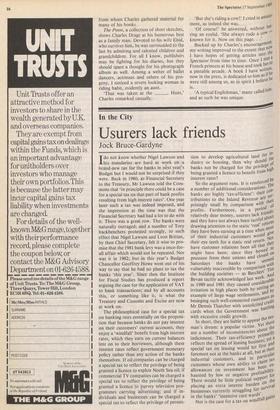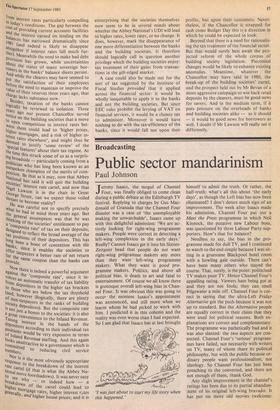In the City
Usurers lack friends
Jock Bruce-Gardyne
Ido not know whether Nigel Lawson and his mandarins are hard at work on a brand-new tax for the banks in next year's Budget but 1 would not be surprised if they were. Back in 1980, as Financial Secretary to the Treasury, Mr Lawson told the Com- mons that `in principle there could be a case for a special tax on that part of bank profits resulting from high interest rates'. One year later such a tax was indeed imposed, and the impression at the time was that the Financial Secretary had had a lot to do with it. There was a great row. The banks were naturally outraged; and a number of Tory backbenchers protested strongly, to such effect that Nigel Lawson and Leon Brittan, by then Chief Secretary, felt it wise to pro- mise that the 1981 bank levy was a once-for- all affair which would not be repeated. Nor was it in 1982; but in this year's Budget Chancellor Geoffrey Howe went out of his way to say that he had no plans to tax the banks `this year'. Since then the Institute for Fiscal Studies has produced a report arguing the case for the application of VAT to bank transactions; and by all accounts this, or something like it, is what the Treasury and Customs and Excise are now at work on.
The philosophical case for a special tax on banking rests essentially on the proposi- tion that because banks do not pay interest on their customers' current accounts, they enjoy a `windfall' benefit from high interest rates, which they earn on current balances lent on to their borrowers, although these interest rates reflect government monetary policy rather than any action of the banks themselves. If oil companies can be charged a special tax to reflect the privilege of being granted a licence to exploit North Sea oil; if commercial TV companies can be charged a special tax to reflect the privilege of being granted a licence to purvey television pro- grammes carrying advertising; and if in- dividuals and businesses can be charged a special tax to reflect the privilege of permis-
sion to develop agricultural land for dustry or housing, then why should the/ banks not be charged for the privilege being granted a licence to benefit from ing'' interest rates?
So the argument runs. It is reinforced by
a number of additional considerations. The banks are highly 'tax-efficient': their CO tributions to the Inland Revenue are 5,Yr;,... prisingly small by comparison with me", profits. Furthermore, in a period oi relatively dear money, usurers lack friends: and they have not always been tactful abt drawing attention to the static 'real' returns they have been earning at a time when rOst of their industrial customers would !,ive,. their eye teeth for a static real return.
theY
have customer relations been all that might have been: since they bowed on pressure from their unions and closed , Saturdays the banks have scenic: vulnerably inaccessible by comparison
the building societies — as BarclaYs'
Bevan tacitly acknowledged last week' Al in 1980 and 1981 they caused considerab e irritation in high places both by setting ab° example of large wage settlements, and as besieging such well-connected customers a., Mr Dennis Thatcher with unsolicited credn cards when the Government was battling with excessive credit growth. In short, they are liable to appear the lax; man's dream: a popular victim. Yet ththe are a number of inconsistencies about indictment. Their tax-efficiency Prirriarl a reflects the spread of leasing business; Yet , special tax on leasing would hit first anu,, foremost not at the banks at all, but at thielarl industrial customers, and in particu customers whose own ability to dein.' allowances on investment has been ex hausted by low or negative profitabilirtYr' There would be little political support placing an extra interest burden on the businesses currently struggling for surviv in the banks' intensive care wards'. s
Nor is the case for a tax on windfall gain tax.
from interest rates particularly compelling in today's conditions. The gap between the cost of providing current accounts facilities and the interest earned on lending on the balances has narrowed dramatically since 1981 (and indeed is likely to disappear altogether if interest rates fall much fur- ther). Meanwhile the need to make bad debt Provision has grown, while uncertainties about the status of many sovereign bor- rowers in the banks' balance sheets persist. And while the clearers may have seemed to Put the satisfaction of their employees before the need to maintain or improve the value of their reserves three years ago, that Charge lacks substance now. 8esicies, taxation of the banks cannot Years be reviewed in isolation. Three 'ears ago our present Chancellor served notice on the building societies that a move to °Pen competition in interest rates bet- ween them could lead to 'higher prices, higher mortgages, and a risk of higher in- terest rates elsewhere', and might thus be 'deemed to justify 'some review' of the special features' about their tax regime. At the time this struck some of us as a surpris- ing broadside — particularly coming from a Politician who has long been known as an t3titsPoken champion of the merits of corn- Petition. He that as it may, now that Abbey National has said it will quit the building societies interest rate cartel, and now that Nigel Lawson is in the chair in Great George Street, can we expect those veiled threats to become reality? He was careful not to specify precisely what he had in mind three years ago. But thhiera.gPrIeral assumption was that he was
;"^ing of the societies' entitlement to pay 7, composite rate' of tax on their deposits,
tax to reflect the broad average of the itax Positions of their depositors. This has b°,1/8, been a bone of contention with !fhb ullKs, since it enables the societies to Offer taxpayers a better rate of net return or the same coupon than the banks can Provide.
Now there is indeed a powerful argument against the 'composite rate', since it in- ,v°Ives an automatic transfer of tax liability from depositors in the higher tax brackets to (and, who are below the tax threshold an , however illogically, there are plenty or nOn-taxpayers in the ranks of building soeietY depositors). But the composite rate is not just a bonus to the societies: it is also aT great convenience to the Inland Revenue. ,axing interest in the hands of the depositors according to their individual tax Positions would be very expensive in terms ,°' Inland Revenue staffing. And this again emoks unattractive to a government which is o rnmitte'd
numbers. to reducing civil service
Nor is it the most obviously appropriate response to the breakdown of the interest rate cartel (if that is what the Abbey Na- tional move foreshadows). It was never easy to see why — or indeed how — a breakdown of the cartel could lead to higher mortgage rates, higher interest rates generally, and higher house prices; and it is unsurprising that the societies themselves now seem to be in several minds about whether the Abbey National's UDI will lead to higher rates, lower rates, or no change. It does, however, mark the disappearance of one more differentiation between the banks and the building societies. It therefore should logically call in question another privilege which the building societies enjoy: tax treatment of their gains from transac- tions in the gilt-edged market.
A case could also be made out for the sort of tax suggested by the Institute of Fiscal Studies provided that it applied across the financial sector: it would be wholly inequitable to apply it to the banks and not the building societies. But since EEC rules prohibit the levying of VAT on financial services, it would be a clumsy tax to administer. Moreover it would have nothing to do with the tax-efficiency of the banks, since it would fall not upon their profits, but upon their customers. Never- theless, if the Chancellor is strapped for cash come Budget Day this is a direction in which he could be expected to look.
Beyond that there is a need for rationalis- ing the tax treatment of the financial sector. But that would surely best await the pro- jected reform of the whole corpus of building society legislation. Piecemeal changes would be likely to enhance existing anomalies. Meantime, whatever the Chancellor may have said in 1980, the break-up of the building societies' cartel, and the.prospect held out by Mr Bevan of a more aggressive campaign to win back retail deposits by the clearers, must be good news for savers. And in the medium term, if it puts pressure on the overheads of banks and building societies alike — as it should — it would be good news for borrowers as well. I doubt if Mr Lawson will really see it differently.







































 Previous page
Previous page